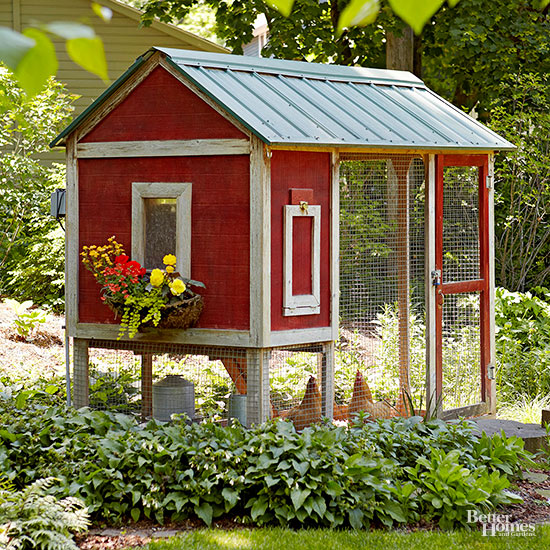






The Chicken Coop: The coop is where your chickens will sleep and lay their eggs. A basic chicken coop needs a secure latch on the door, hardware cloth-covered windows to keep predators out, roosting bars for the chickens to perch on, and nesting boxes filled with soft straw or pine shavings in which to lay their eggs. Allow for one box for every 3-4 hens and at least 2-4 square feet of floor space per hen.
The Run: The run is the enclosed pen where your chickens will spend their days scratching for bugs, sunning themselves, and chasing each other. The run should be enclosed by a welded-wire or chain-link fence to keep out foxes, dogs, and other predators. It also should be covered to keep out hawks and owls. Allow for at least 10 square feet of run space per hen.
Free-ranging (roaming not in a fenced in yard) should only be allowed if you are outside with your hens supervising or have other precautions in place, such as livestock guard animals.
Chicken Feed: Chickens over 5-6 months old should be at laying age and fed layer feed. Feed comes in either crumble, pellet, or whole grain form and can be organic, nonorganic, nonGMO, or supplemented with omega-3, probiotics, and other nutrients. Feed should be provided either all day or for at least half an hour in the morning and half and hour at night.
Supplements: In addition to layer feed, laying hens need a calcium supplement, which can be in the form of crushed oyster shell or eggshell. The supplement should be fed free-choice in a separate container so each hen can eat as much as she needs. Roosters and nonlaying hens don't need the supplement.
Grit or coarse dirt is also necessary to help the chickens digest their feed. Grit is available commercially, but free-ranging chickens generally can find their own.
Water: Chickens need constant access to water. The water should be clean, cool, and fresh. Apple cider vinegar can be added (a ratio of 1 tablespoon of apple cider vinegar per gallon of water) a few times a week to help keep algae and bacteria out of the water and provide health benefits to your chickens.
Dust Bath: Chickens need access to loose, dry dirt or sand in which to bathe. This is how they stay mite-free and also keep their feathers clean. You can set up an area for them in a kiddie pool or other large container, or they will make their own spot. They might make their own spot anyway, and generally it's somewhere you don't want them!
These few basics should help get you started on the wonderful journey known as backyard chicken-keeping.
Download free plans for a chicken coop.
Copyright © www.100flowers.win Botanic Garden All Rights Reserved